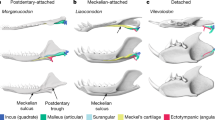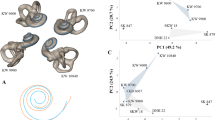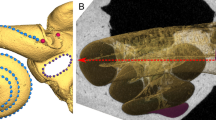Abstract
FEW problems in morphology have aroused more interest than that of the origin of the ear ossicles. It is a familiar fact that the Mammalia differ from all other gnathostomes in having a chain of three ossicles (stapes, incus, and malleus) serving to convey vibrations from the tympanic membrane to the labyrinth lodged in the auditory capsule. The other tetrapods (reptiles, birds, and amphibians) have only one ossicle, the stapes (columella auris). The other gnathostomes (fishes) have no functioning ear ossicles.
This is a preview of subscription content, access via your institution
Access options
Subscribe to this journal
Receive 51 print issues and online access
$199.00 per year
only $3.90 per issue
Buy this article
- Purchase on Springer Link
- Instant access to full article PDF
Prices may be subject to local taxes which are calculated during checkout
Similar content being viewed by others
References
Gaupp, E., in Hertwig, O., Handb. Vergl. und Exp. Entw.-Lehre, 3, 2 (1905).
Gaupp, E., Arch. Anat. and Phys. Abt. Anat., Supp. (1913).
Stadtmüller, F., in Bolk-Göppert, et al., Handb. der Vergl. Anat. der Wirbeltiere (1936).
Schmalhausen, J., Anat. Anz., 56 (1922).
Bertmar, G., Acta Zoologica, 40 (1959).
Goodrich, E., Study on the Structure and Development of Vert. (London, 1930).
Author information
Authors and Affiliations
Rights and permissions
About this article
Cite this article
BERTMAR, G. Homology of Ear Ossicles. Nature 193, 393–394 (1962). https://doi.org/10.1038/193393a0
Issue Date:
DOI: https://doi.org/10.1038/193393a0
Comments
By submitting a comment you agree to abide by our Terms and Community Guidelines. If you find something abusive or that does not comply with our terms or guidelines please flag it as inappropriate.



